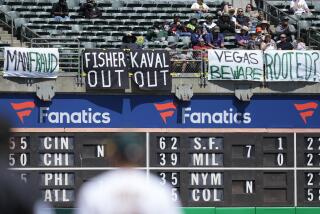Bruce Smith, 71; fought terrorism after his wife died when a bomb brought flight down at Lockerbie
Bruce Smith, a former Pan Am pilot who became a leading anti-terrorist activist after his wife died in the bombing of Pan Am Flight 103 over Lockerbie, Scotland, has died. He was 71.
Smith died Sept. 21 when the single-engine plane he was flying crashed near Daytona Beach, Fla., shortly after takeoff from a municipal airport, said Scott Smith, one of his four sons. Engine failure led to the crash, his family said.
In 1988, Smith’s wife, Ingrid, was one of 270 people, mainly Americans, killed when a bomb linked to a Libyan agent exploded on Flight 103.
Smith used Pan Am’s $100,000 insurance payout on his wife’s death to push for the development of a federal program that gave cash rewards for tips leading to the arrest of suspected terrorists.
“I couldn’t stand doing nothing,” Smith told The Times in 1995. “So I got the notion that it might be helpful to offer a bigger reward for information.”
Experts told him it would take at least $3 million to make a difference -- the bounty at the time was a few hundred thousand dollars. Smith prodded Congress to pass legislation that increased the reward to up to $2 million and persuaded airline industry groups to contribute, boosting the fund to $4 million.
Paul Hudson, who lost a daughter in the Lockerbie bombing, told The Times on Thursday that “thousands of lives have been saved as a result of major aviation terrorist bombing plots that were foiled” because of the increased reward and additional publicity the fund received.
The best-known arrest linked to the fund occurred when an informant helped investigators track down Ramzi Ahmed Yousef, the alleged mastermind of the 1993 World Trade Center bombing.
Without Smith’s “single-minded beliefs . . . history would be different,” said Hudson, executive director of the Aviation Consumer Action Project, an advocacy group.
Smith’s second major accomplishment was doggedly “pursuing those responsible for the bombing of Pan Am Flight 103,” Hudson said.
Smith was the first family member of a victim to file a lawsuit against Libya in federal court in New York, Hudson said. After the court ruled that Libya, as a sovereign state, had immunity under existing law, Smith successfully lobbied Congress to amend the Foreign Sovereign Immunities Act.
Once families could sue state sponsors of terrorism in U.S. courts, Smith and other families of those who died on Flight 103 sued Libya. The country negotiated a $2.7-billion settlement. Dozens of civil cases have since been brought against terrorism sponsors, Hudson said.
Pursuing the legal action against Libya eventually forced Smith into bankruptcy and life on a boat in the Bahamas.
“When somebody hurt him or his family, that would galvanize him into action,” his son said. “If the cause was worthy, he would pursue it to the bitter end.”
The son of a sheet-metal worker and a homemaker, Smith was born Aug. 6, 1936, in Kalispell, Mont., and moved to Alaska in the 1950s. He studied science and history at Stanford University.
He started flying for Pan Am in 1966 and left the airline just before the company’s collapse in 1991. He also was a pilot for Delta and had lived in Europe for years but was building a home in Homer, Alaska.
In retirement, Smith wrote a Cold War espionage thriller called “Black Sea Monster” (2005) and was working on a book about the Lockerbie bombing.
In addition to his son, Scott, Smith is survived by his wife, Galyna; three other sons, Rodney and Bradley Smith and Robin Ladue; daughter Kristie Smith; a sister; two brothers; and four grandchildren.
--







